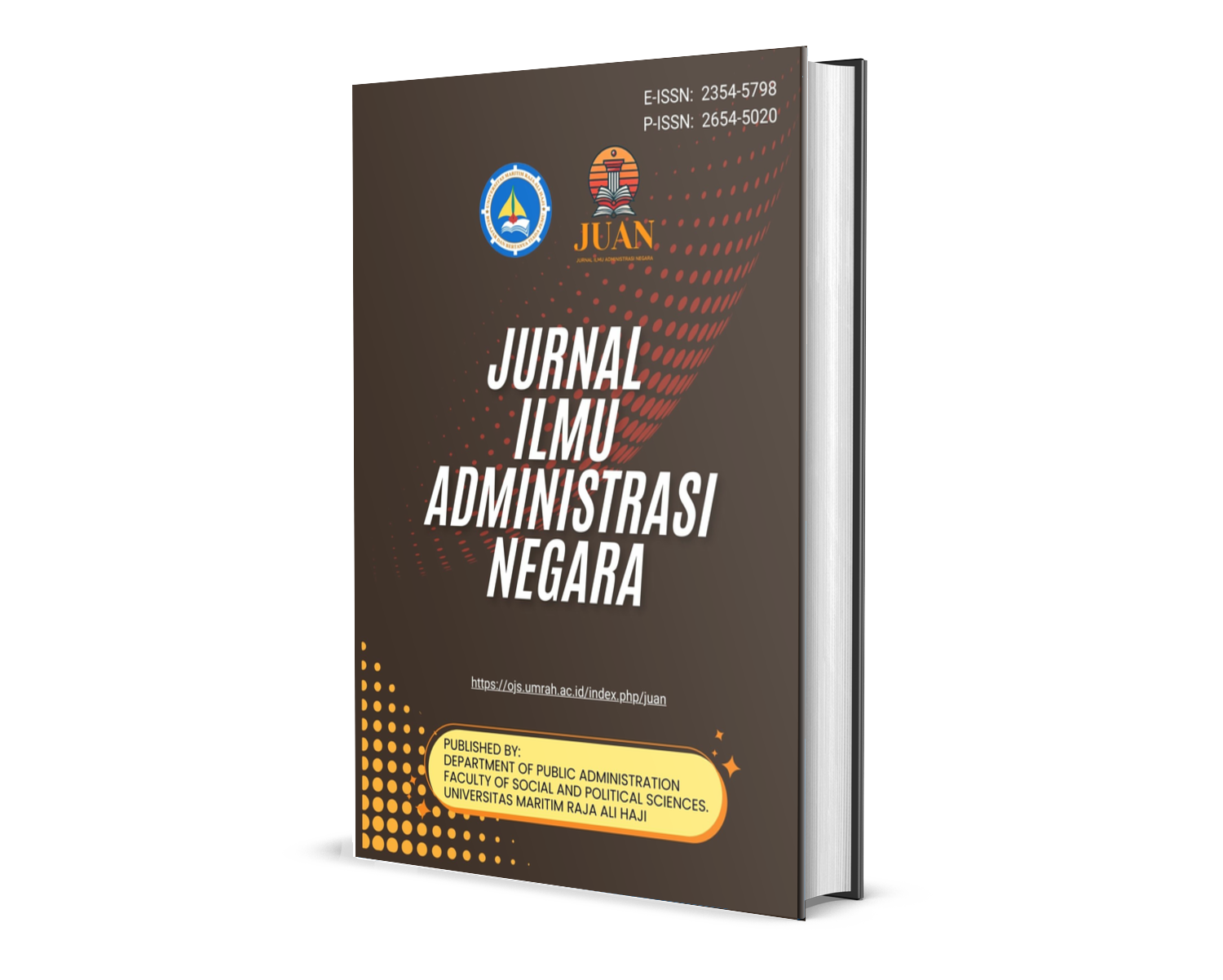The Role of Public Administration Ethics in Realizing Clean and Transparent Governance
DOI:
https://doi.org/10.31629/juan.v12i2.7353Keywords:
Accountability, Administrative Ethics, Transparency, GovernanceAbstract
Public administration ethics plays a crucial role in realizing clean and transparent governance. In the context of increasing global demands for honest, just, and transparent government actions, public administration ethics ensures that government officials act with integrity, professionalism, and social responsibility. The research aims to analyze the significance of these ethics in promoting governance that is free from corruption, collusion, and nepotism (KKN), and how its application can improve public trust and the quality of services. A qualitative, descriptive research methodology, primarily utilizing a literature review, was employed to explore the role of ethical principles, such as honesty, fairness, openness, and professionalism, in the public administration process. The results of this research indicate that while ethics are integral to fostering a clean government, challenges such as a deeply rooted culture of corruption, ineffective monitoring systems, and lack of public participation hinder their full implementation. Furthermore, the study highlights the importance of transparent decision-making, public participation, and accountability in reinforcing these ethical standards. The research concludes that strengthening public administration ethics, alongside enhancing transparency and citizen engagement, is essential for ensuring the effectiveness, fairness, and trustworthiness of public governance. Consequently, it provides recommendations for governmental reform to enhance ethical practices, improve public service delivery, and foster a more accountable and transparent system.
References
Bailey, S. K. (1964). Ethics and Public Service. Public Administration Review, 24(4), 234. https://doi.org/10.2307/973314
Boocock, M., & Grahame, D. (2003). Qualitative interview studies: learning through experience. Venture Capital, Islamic Finance and SMEs, 67–84. https://doi.org/10.4324/9781410609373-8
Buckler, S. (2007). Political Theory and Political Ethics in the Work of Hannah Arendt. Contemporary Political Theory 2007 6:4, 6(4), 461–483. https://doi.org/10.1057/PALGRAVE.CPT.9300299
Ciulla, J. B. (2003). The ethics of leadership. Wadsworth/Thomson Learning.
Cooper, T. L. (2000). The Emergence of Administrative Ethics as a Field of Study in the United States. In Handbook of Administrative Ethics (pp. 1–36). Routledge. https://doi.org/10.4324/9781482270457-2
Fadhlurrohman, M. I., Syarifuddin, T. I., & Khairina, E. (2021). Political ethics in leadership: Impact of behaviour ethics implementation of regional heads in Indonesia. Journal of Government and Political Issues, 1(1), 45–55–45–55. https://doi.org/10.53341/JGPI.V1I1.10
Fikriana, A., & Suhendra, S. (2023). Illegal Financial Technology Practices in the Form of Online Loans Viewed from Business Ethics. JUSTICES: Journal of Law, 2(4), 228–235. https://doi.org/10.58355/JUSTICES.V2I4.94
Green, B. N., Johnson, C. D., & Adams, A. (2006). Writing narrative literature reviews for peer-reviewed journals: secrets of the trade. Journal of Chiropractic Medicine, 5(3), 101–117. https://doi.org/10.1016/S0899-3467(07)60142-6
Kitchenham, B., Pearl Brereton, O., Budgen, D., Turner, M., Bailey, J., & Linkman, S. (2009). Systematic literature reviews in software engineering - A systematic literature review. In Information and Software Technology (Vol. 51, Issue 1, pp. 7–15). https://doi.org/10.1016/j.infsof.2008.09.009
Krisharyanto, E., Setyowati, P. J., & Wulandari, S. (2021). Code of Ethics as an Instrument in Improving the Performance of the BUMD Supervisory Board. SSRN Electronic Journal. https://doi.org/10.2139/SSRN.3806516
Mattingly, C., & Throop, J. (2018). The Anthropology of Ethics and Morality. Annual Review, 47, 475–492. https://doi.org/10.1146/ANNUREV-ANTHRO-102317-050129
Milton-Smith, J. (1995). Ethics as excellence: A strategic management perspective. Journal of Business Ethics, 14(8), 683–693. https://doi.org/10.1007/BF00871349/METRICS
Moore, G. (2008). Re-Imagining the Morality of Management: A Modern Virtue Ethics Approach. Business Ethics Quarterly, 18(4), 483–511. https://doi.org/10.5840/BEQ200818435
Odongo, N. H., & Wang, D. (2018). Corporate responsibility, ethics and accountability. Social Responsibility Journal, 14(1), 111–122.
Postema, G. J. (1983). Moral responsibility in professional ethics. In Profts and Professions. The Humana Press.
Rossiter, A., Prilleltensky, I., & Walsh-Bowers, R. (2005). A postmodern perspective on professional ethics. In Practice and Research in Social Work: Postmodern Feminist Perspectives (pp. 84–104). Taylor and Francis. https://doi.org/10.4324/9780203981979-12
Simmons, J. (2008). Ethics and morality in human resource management. Social Responsibility Journal, 4(1/2), 8–23. https://doi.org/10.1108/17471110810856794/FULL/XML
Sorokin, P. (1957). Social and cultural dynamics: A study of change in major systems of of Art, Truth, Ethics, Law and Social. P. Sargent.
Stephens, W., Vance, C. A., & Pettegrew, L. S. (2012). Embracing Ethics And An Analytic Essay for the Accounting Profession. The CPA Journal, 82(1).
Downloads
Published
How to Cite
Issue
Section
License
Copyright (c) 2024 Kholifatus Syadiyah, Salsabilla Azzahra Niesma Putri, Hayat Hayat

This work is licensed under a Creative Commons Attribution-NonCommercial 4.0 International License.
You are free to:
- Share — copy and redistribute the material in any medium or format for any purpose, even commercially.
- Adapt — remix, transform, and build upon the material for any purpose, even commercially.
- The licensor cannot revoke these freedoms as long as you follow the license terms.
Under the following terms:
- Attribution — You must give appropriate credit, provide a link to the license, and indicate if changes were made . You may do so in any reasonable manner, but not in any way that suggests the licensor endorses you or your use.
- ShareAlike — If you remix, transform, or build upon the material, you must distribute your contributions under the same license as the original.
- No additional restrictions — You may not apply legal terms or technological measures that legally restrict others from doing anything the license permits.














